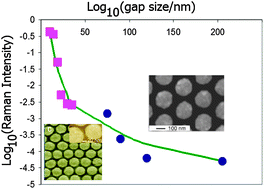Despite 35 years of research and over 10 000 publications on surface-enhanced Raman spectroscopy (SERS), a universal agreement regarding the physical mechanism responsible for the effect still appears to be elusive. Is SERS in actual fact better understood than the impression given by a number of tenacious misconceptions? Professor Martin Moskovits believes so.
 In his recent PCCP Perspective, Moskovits discusses several important topics in SERS, which are often subject to dispute or contradictions in the current literature, including its physical origin. He explains plasmonic theory, the mechanism that underlies the current understanding, and reasons that alternatively proposed mechanisms, such as chemical enhancement, have not only impeded the establishment of a universally accepted understanding, but have hindered the use of SERS in applications such ultrasensitive chemical and biological sensors.
In his recent PCCP Perspective, Moskovits discusses several important topics in SERS, which are often subject to dispute or contradictions in the current literature, including its physical origin. He explains plasmonic theory, the mechanism that underlies the current understanding, and reasons that alternatively proposed mechanisms, such as chemical enhancement, have not only impeded the establishment of a universally accepted understanding, but have hindered the use of SERS in applications such ultrasensitive chemical and biological sensors.
SERS is a surface-sensitive technique that enhances Raman signals from Raman-active analyte molecules absorbed onto specially prepared metal surfaces. SERS is sufficiently sensitive to allow the detection of single molecules.
SERS theory, as it is commonly applied, is a classical theory largely based on electrostatics. To obtain a more complete understanding of SERS, a theory based on quantum mechanics, and approached as a dynamical theory, needs developing, Moskovits explains in his review. He suggests that in the meantime, researchers should deal with the surface chemistry that arises in a given experiment on a molecule-by-molecule basis.
Read the details in this HOT PCCP Perspective today:
Persistent misconceptions regarding SERS
Martin Moskovits
DOI: 10.1039/C2CP44030J
If you enjoyed this perspective, you may also be interested in our web collection on SERS.










